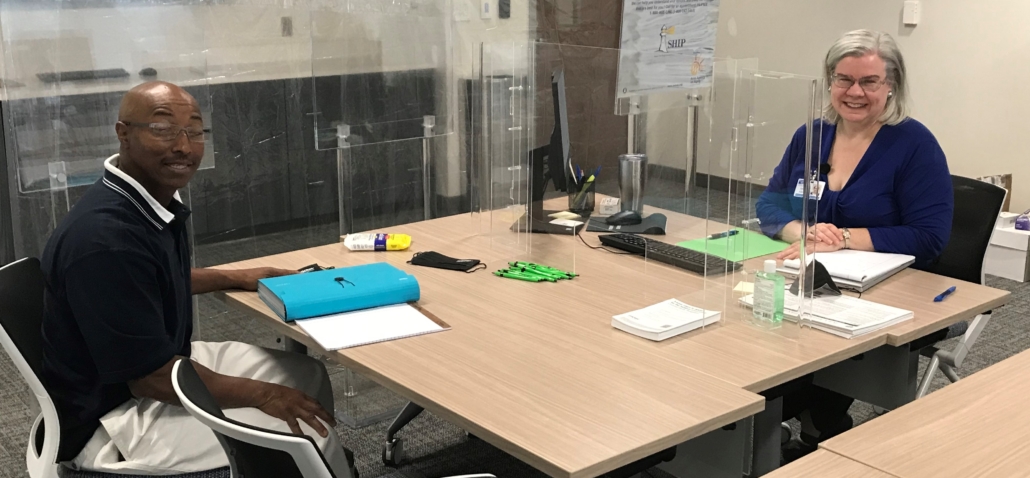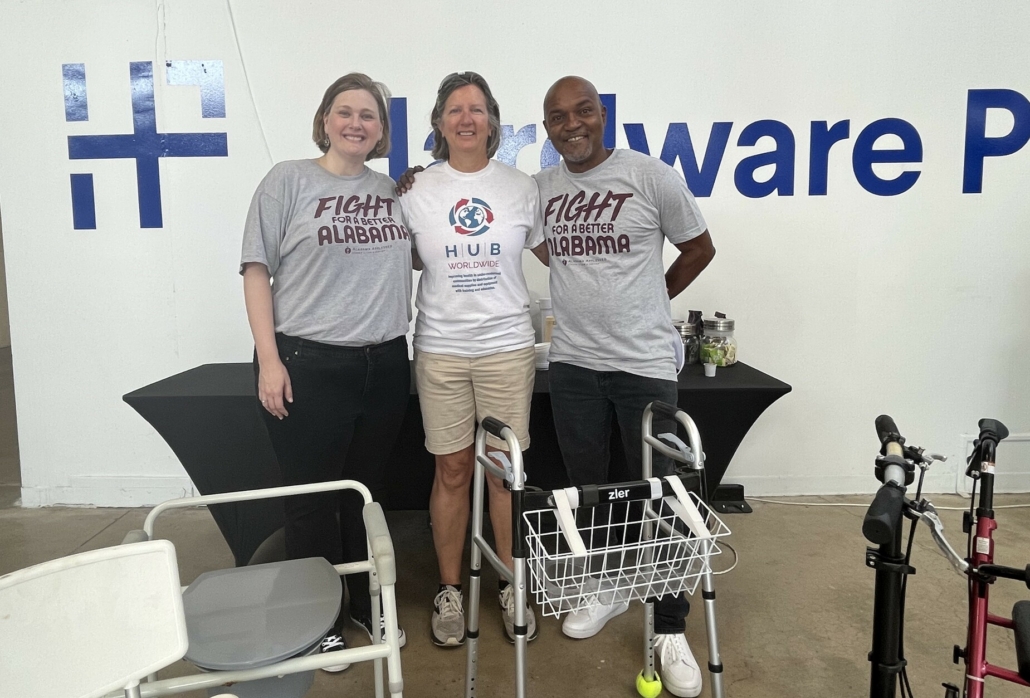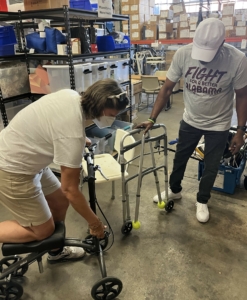by Catherine Alexander-Wright, MSW, LICSW, Alabama Appleseed Social Worker

Appleseed client Joe Bennett with Judy Allen from the United Way of Central Alabama
April 15 along with its not-so-much-recognized but equally-dreaded friend April 18 can be, let’s be honest, a negative experience ranging from nuisance to financial hardship. Regardless of one’s thoughts, opinions, or feelings about taxes, I doubt that tax day is anyone’s favorite date other than – and with my express apologies to – those with birthdays and anniversaries on this date! What if, however, we looked at taxes differently? Imagine you had not been able to work in 2021, meaning you could neither earn an income nor pay taxes. Imagine viewing today as one of the days of the year to exercise one’s participation in the democratic process inextricably linked to election day.
That’s what paying taxes means to Appleseed’s Second Chance clients. For these men, now in their 50s, 60s, and 70s, the consequences of criminal convictions decades ago, included forfeiting the freedom to earn a living, contribute to the economy, and pay taxes. Taxes mean freedom, a welcome consequence of their new lives of meaning and productivity.
Joe Bennett is one such client. In 1997, Joe was given two life-without-parole (“LWOP”) sentences for two counts of robbery stemming from a single incident at a barbecue restaurant. Joe is one of the many people in Alabama who had been condemned to die in prison for an offense without physical injury, enhanced by minor prior offenses under Alabama’s Habitual Felony Offender Act (HFOA). Due to changes in that law in the 1990s and sentencing reforms in 2015, three of the four prior offenses used to enhance Joe’s sentence under the HFOA could not be used for enhancement purposes today. If sentenced today, Joe would be ineligible for a sentence of life imprisonment without parole; instead, he likely would receive a split sentence with two years prison time and seven years on probation: two years versus a lifetime.
Upon Joe’s release on September 21, 2021, he became employed at a tree service, where he is a dedicated and trusted employee. In early 2022, Joe acknowledged that he needed to file income tax returns for 2021, the first he has been able to file in decades. I used to experience anxiety or dread for my clients during tax time. So many well-meaning friends and family members, in addition to pop-up tax shops with a variety of discernable intentions, appear this time of year. The last thing I wanted our clients to experience is a tax anomaly or worse, be taken advantage of, while they were attempting to re-establish themselves personally and professionally. Not to mention that a few of our clients experienced identity theft while incarcerated, specific issues of which needed to be addressed by a trained tax preparer.
Several decades of social work have made calling the United Way of Central Alabama, specifically Judy Allen with Volunteer Income Tax Assistance, a reflex. As I explained to Judy what Joe and other Appleseed clients might face as they attempted to file their 2021 taxes, she already knew. She asked me some screening questions, explained specific tax nuances that might apply, and gave me a list to help our clients organize for their tax appointments. She made in-person appointments for those clients who needed them and made them during a time minimally impactful to their work schedules. On the day of the appointments, Judy took the time to explain why she was asking for each document and what each section of each tax form meant. Our clients felt secure in that they had done everything they needed to do to comply with federal law in a trustworthy setting that respected their dignity and privacy. With this assistance, United Way of Central Alabama has become one of many service providers across the Greater Birmingham area who have embraced our formerly incarcerated clients. We are so grateful!
Today does not have to be a nuisance; it can also be one of gratitude. Today, I am grateful for attorneys who persist, public servants who listen, and reconsideration of inequitable sentences. I am grateful for second chances. I am grateful for employers who give jobs to justice-involved individuals and to our clients who want to participate fully in a system that has not always been fully just with them. I am grateful to Judy Allen and the United Way of Central Alabama for providing services to all without judgment, and providing essential, responsible tax preparation services so that individuals don’t inadvertently end up with additional tax issues. And I am grateful for Appleseed’s clients, whose hope, determination, and tenacity inspire me every day.

 A key component of supportive case management is retaining a strong relationship with community partners. Alabama Appleseed is grateful for HUB Worldwide, a nonprofit organization in Birmingham. HUB is an acronym for “Health Under-resourced Biomedical.” Laura Gilmour founded HUB Worldwide in 2019 with the twin goals of “bringing surplus supplies to healthcare institutions with shortages, thereby increasing the range of care available, and of preventing more degradation of groundwater and the ground itself due to toxin/leachate filled decay of non-organic medical supplies in landfills.”
A key component of supportive case management is retaining a strong relationship with community partners. Alabama Appleseed is grateful for HUB Worldwide, a nonprofit organization in Birmingham. HUB is an acronym for “Health Under-resourced Biomedical.” Laura Gilmour founded HUB Worldwide in 2019 with the twin goals of “bringing surplus supplies to healthcare institutions with shortages, thereby increasing the range of care available, and of preventing more degradation of groundwater and the ground itself due to toxin/leachate filled decay of non-organic medical supplies in landfills.”


